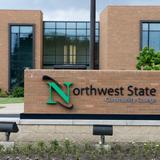- Ivy Tech Community College is the state's largest public postsecondary institution and the nation's largest singly accredited statewide community college system serving nearly 200,000 students annually. Ivy Tech has campuses throughout Indiana. It serves as the state's engine of workforce development, offering affordable degree programs and training that are aligned with the needs of its community along with courses and programs that transfer to other colleges and universities in Indiana. It is accredited by the Higher Learning Commission and a member of the North Central Association.
School Highlights
Ivy Tech Community College-Northeast serves 10,932 students (45% of students are full-time).
The college's student-teacher ratio of 40:1 is higher than the state community college average of 34:1.
Minority enrollment is 100% of the student body (majority Black and Hispanic), which is less than the state average of 51%.
Quick Facts (2026)
- Enrollment: 10,932 students
- In-state tuition: $3,257
- Out-state tuition: $6,761
- Student-teacher ratio: 40:1
- Source: Integrated Postsecondary Education Data System (IPEDS)
Top Rankings
Ivy Tech Community College-Northeast ranks among the top 20% of public schools in Indiana for:
Category
Attribute
Affordability
Community Size
School Overview
The teacher population of 274 teachers has stayed relatively flat over five years.
Ivy Tech Community College-Northeast
(IN) Community College Avg.
Carnegie Classification
Associate's--Public Urban-serving Single Campus
Baccalaureate Colleges: Arts & Sciences Focus
Institution Level
Less than 2 yrs
Four or more years
Institution Control
Public
Private, for profit
Total Faculty
274 staff
145 staff
School Calendar
Student Body
The student population of Ivy Tech Community College-Northeast has stayed relatively flat over five years.
The student-teacher ratio of 40:1 has stayed the same over five years.
The Ivy Tech Community College-Northeast diversity score of 0.00 is less than the state average of 0.65. The school's diversity has declined by 100% over five years.
Total Enrollment
10,932 students
3,848 students
Student-Teacher Ratio
40:1
34:1
# Full-Time Students
4,903 students
1,083 students
# Part-Time Students
6,029 students
2,765 students
# Enrollment Undergraduate
n/a
289 students
# Full-Time Undergraduate Students
10,932 students
1,548 students
# Full-Time Graduate Students
n/a
5,260 students
# Part-Time Undergraduate Students
n/a
180 students
# Part-Time Graduate Students
n/a
35 students
Total Dormitory Capacity
n/a
196 students
% American Indian/Alaskan
n/a
1%
% Asian
n/a
2%
% Hispanic
n/a
4%
% Black
n/a
9%
% White
n/a
49%
% Two or more races
n/a
3%
% Unknown races
100%
32%
Diversity Score
n/a
0.65
College Completion Rate (Students who graduate in less than 4 years) (Year 2010)
6%
10%
College Completion Rate (Students who graduate in 4 years or more than 4 years)
n/a
33%
Average Graduate Earnings (10 Years) (Year 2010)
$29,200
$30,200
Tuition and Acceptance Rate
The public in-state tuition of $3,257 is less than the state average of $3,695. The in-state tuition has grown by 15% over four years.
The public out-state tuition of $6,761 is less than the state average of $7,846. The out-state tuition has grown by 19% over four years.
In-State Tuition Fees
$3,257
$3,695
Out-State Tuition Fees
$6,761
$7,846
% Students Receiving Some Financial Aid
47%
56%
Median Debt for Graduates (Year 2010)
$11,518
$12,605
Median Debt for Dropouts (Year 2010)
$6,000
$5,500
Acceptance Rate
n/a
74%
SAT Reading
n/a
485
SAT Math
n/a
485
SAT Writing
n/a
465
ACT Composite
n/a
22
ACT English
n/a
21
ACT Math
n/a
21
Source: 2023 (or latest year available) Integrated Postsecondary Education Data System (IPEDS) , School Administrators
School Notes
- Ivy Tech Community College’s Northeast region is located in Fort Wayne and serves nine counties in the northeast corner of the state. It is the second largest region in the Ivy Tech system. Ivy Tech–Northeast has grown from 131 students enrolled in three programs in August 1969, when the College opened its doors in rented facilities in a former high school, to more than 11,000 students enrolled in seven schools and 32 degree programs in 2010. A 40,000 square-foot building with classroom, laboratory, workshop, and office space was completed in October 1976. This was the region’s first college-owned building on college-owned land. An adjoining structure of the same size was completed in the spring of 1981. The Fort Wayne campus nearly doubled in size with the construction of a third building—a 110,000 square-foot structure that was completed in December 1996. The third phase of the building, with its adjacent parking, totally filled the original 26-acre campus. All campus development for the foreseeable future is taking place on what is being called the North Campus. (Details of the development of the North Campus can be found elsewhere in this publication.) The North Campus is approximately one mile away and is separated form the original campus by Indiana University–Purdue University Fort Wayne.
Frequently Asked Questions
How much does Ivy Tech Community College-Northeast cost?
Ivy Tech Community College-Northeast's tuition is approximately $3,257 for In-State students and $6,761 for Out-State students.
What is Ivy Tech Community College-Northeast's ranking?
Ivy Tech Community College-Northeast ranks among the top 20% of community college in Indiana for: Least expensive tuition, Average community college minority breakdown and Largest student body.
Recent Articles

Community College vs. Bootcamps for Tech Careers in 2026
Community college vs. bootcamps in 2026. Compare cost, outcomes, credentials, and hiring trends to choose the best tech career path.

How to Build a Class Schedule That Fits Your Life (Spring 2026)
Learn how to build a class schedule that fits your life with expert tips, updated strategies for Spring 2026, and practical planning tools for students and families.

Top 10 Jobs for Community College Graduates in 2026
Meta Description: Discover high-demand jobs for community college graduates, with current salary trends, costs, and career pathways.









